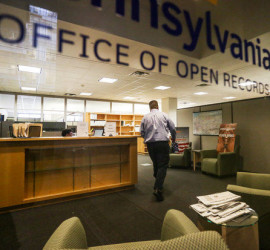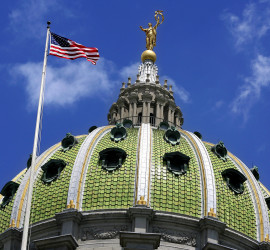Office of Open Records advisories to agencies regarding COVID-19
The Office of Open Records has issued advisories to guide local governments on how to handle public records and public meetings while agencies combat the spread of the new coronavirus.
The upshot: Agencies can delay responding to Right-to-Know Requests under various emergency provisions, but agencies are encouraged to be as transparent as possible to build trust. You can read the advisory regarding Right to Know requests here.
Even if public meetings are being held by teleconference or video conference, the Sunshine Act still applies — the public still has a right to attend and participate. Agencies are also encouraged to record and post all such meetings online. You can read the advisory regarding the Sunshine Act here.
Supreme Court closes all courts except for “essential proceedings”
Most court proceedings are postponed. Those that remain, mostly involving matters dealing with someone’s personal safety (such as the issuing of protection from abuse orders) and someone’s loss of freedom (such as preliminary arraignments) can continue in courtrooms designed to minimize person-to-person contact. How will this be interpreted regarding public access to open courts? We’ll soon see. You can read the Supreme Court order here.
Legislature loosens voting, waiting requirements for bill during COVID-19 emergency
Both the Pennsylvania Senate and House have passed new rules in light of the coronavirus emergency. Both chambers adjourned, though they remain on 12-hour call by the chair.
In the Senate, members can file bills electronically and participate in committee meetings and sessions remotely. The new rules last through Jan. 31 or 10 days after the governor’s emergency order expires, whichever comes first. You can find the full Senate resolution here.
Meanwhile, in the House, members can vote on bills or participate in committees remotely, or through proxy. The House no longer has to post bills 24 hours before a committee vote, 12 hours after a bill is amended on second consideration or six hours to be voted on concurrence. For now, the wait period for any of those three steps is reduced to three hours. The new rules expire when the governor’s emergency order expires. You can find the resolution authorizing this here.
From the PaFOIC President
The Pennsylvania Freedom of Information Coalition is back!
With newspapers folding, fake news sites proliferating, and various groups chipping away at Pennsylvania’s landmark 2007 Right-to-Know Law, it’s more important than ever for citizens to defend our right to access information about what our government is doing.
We’re not an industry or special interest group; we’re a coalition, an alliance of citizens, journalists, librarians, attorneys, researchers, teachers, and other human beings who live, work, pay taxes, volunteer, send our kids to school, fish and hunt, and need and use the services that government provides.
We are dedicated to ensuring that all people have full access to Pennsylvania state and local government records and proceedings. Government runs best when it’s conducted in the sunlight, in full view of the people it represents.
We hope the resources on these pages will help you navigate Pennsylvania’s open government laws, and we invite you to join us. Together, we can make sure Pennsylvania has a bright, open future!
– Susan Schwartz, President






